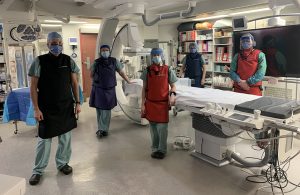Angiography/interventional radiology
Angiography radiology

Angiography radiology is a medical procedure that is performed by a radiologist with the assistance of a nurse and a technologist.
Angiography is used to examine the blood vessels for blockages and other conditions by observing the flow of blood in the veins and arteries. A contrast (dye) is injected into the patient to visualize the blood vessels.
Angiograms are performed in many areas including the arms, legs, heart, lungs and brain. These tests help doctors to determine if there are blood vessel blockages, weakening of the vessels, internal bleeding and/or damage to the circulatory system caused by illness or injury. In some cases, doctors can treat the problem during the angiogram procedure.
Interventional radiology
Interventional radiology is a method of treatment that uses X-rays to guide the insertion of catheters (tubes), wires, and other instruments into the body through blood vessels and organs.
Interventional radiology is often used as an alternative to much more invasive procedures, such as surgery, to enhance the quality of life for patients.
Examples of procedures:
- Peripheral inserted central catheter (PICC) line insertions
- Port-a-catheter insertions
- Lung biopsy
- Kidney biopsy
- Liver biopsy
- Percutaneous nephrostomy tube insertions
- Angiogram procedures
- Dialysis graft
Locations and hours of service
| Health Sciences Centre (HSC) | All appointments – 709-777-9729 8:00 a.m. – 3:30 p.m. Monday to Friday |
| St. Clare’s Mercy Hospital | All appointments – 709-777-9729 8:00 a.m. – 3:30 p.m. Monday to Friday |
Please note:
- Patients are notified by telephone and/or appointment letter for all services that require an appointment. To inquire about your angiography/interventional radiology appointment, please call 709-777-8648.
- If you need to cancel or reschedule your appointment, please contact us.
How to prepare
Preparation will vary by procedure. Instructions for preparation specific to your examination will be included in your appointment letter. The doctor who ordered your examination may also give you information about the required preparation.
In addition, please:
- bring a list of all your medications to your appointment with you;
- arrange for a support person and/or driver to accompany you to these procedures;
- arrive 15 minutes before your appointment time to register; and
- ensure that you have completed the necessary bloodwork prior to attending your appointment. If your bloodwork has not been completed in seven days prior to your appointment, your procedure will be cancelled.
Benefits
- Angiography procedures can diagnose or treat a variety of conditions and can prevent patients from having to undergo invasive surgery.
- If surgery is still necessary, it can be performed more accurately. For example, if an area of severe arterial narrowing is detected, angioplasty can be performed immediately to place a stent in the narrowed section of the artery.
- Interventional radiology is a particularly beneficial treatment option for patients since the procedures are minimally invasive and performed using small skin incisions using local anesthesia.
- If a hospital stay is required, it is typically shorter in length.
- Recovery time is also much shorter than surgery.
Risks
- Slight risk of contrast (dye) leaking into the skin in the area where the intravenous injection is placed. This is not serious but may cause some discomfort.
- Slight risk of an allergic reaction to contrast.
- Slight risk a blood clot could form at the injection site.
- Radiation exposure, as with all X-ray procedures. Precautions are continually taken to minimize the amount of radiation to complete the procedure.
Safety precautions
Please advise your doctor, the technologists performing the procedure and other staff in our Medical Imaging Department of any of the following:
- The possibility that you could be pregnant.
- Any allergies.
- Any medications you are taking.
- A history of asthma, heart or kidney problems.
- Any allergic reactions to anesthetics or X-ray contrast dyes.
